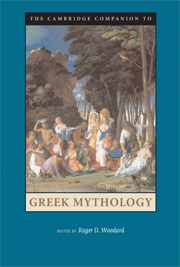Book contents
- Frontmatter
- Introduction: Muthoi in Continuity and Variation
- Part I Sources and Interpretations
- Part II Response, Integration, Representation
- 8 Greek Myth and Greek Religion
- 9 Myth and Greek Art: Creating a Visual Language
- 10 Mythic Landscapes of Greece
- 11 Politics and Greek Myth
- 12 Ovid and Greek Myth
- Part III Reception
- Bibliography
- Index
8 - Greek Myth and Greek Religion
from Part II - Response, Integration, Representation
Published online by Cambridge University Press: 28 March 2009
- Frontmatter
- Introduction: Muthoi in Continuity and Variation
- Part I Sources and Interpretations
- Part II Response, Integration, Representation
- 8 Greek Myth and Greek Religion
- 9 Myth and Greek Art: Creating a Visual Language
- 10 Mythic Landscapes of Greece
- 11 Politics and Greek Myth
- 12 Ovid and Greek Myth
- Part III Reception
- Bibliography
- Index
Summary
Neither “myth” nor “religion” constitutes a category native to Greek thought. Neither myth nor religion were conceived of as such by the Greeks - neither myth as a corpus of (fabulous) tales of gods and heroes dependent on a frame of comprehensive thought, nor religion as a set of beliefs and practices relative to a divine configuration (not even in the Roman sense of regulated cult observance). But, in the case of the former, we have a series of narratives with argumentative and pragmatic value that describe, in poetic form, the heroic past of Greek cities or of the “Greek” community (experienced as tò Hellēnikón only from Herodotus on), narratives that, recited or sung as palaiá or arkhîa, make reference to the ancient history of Greece and correspond to mûthoi. In the case of the latter, we can think in terms of divine and heroic figures, in terms of civic spaces reserved for them, and in terms of the numerous ritual practices that sought, through offerings of various types, to influence divine intervention in the present: tà hierá ('offerings, victims'), tà nómima ('what is prescribed'; hence 'customs, rites') to cite only terms related to sacrificial offerings and to the implicit rules animating cult practices, and to underscore that these practices are always integrated into the calendar that gives rhythm to the religious and political life of each city, in conjunction with the particular assemblage of gods and heroes who are honored there.
- Type
- Chapter
- Information
- The Cambridge Companion to Greek Mythology , pp. 259 - 285Publisher: Cambridge University PressPrint publication year: 2007
- 2
- Cited by



